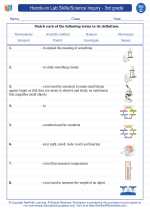Experiments: Understanding the Scientific Method
Experiments are a fundamental part of the scientific method. They are structured and controlled procedures used to test hypotheses, theories, and to discover new scientific knowledge. Conducting experiments allows scientists to systematically investigate and understand the natural world.
The Scientific Method
The scientific method is a systematic way of studying the world around us. It involves several steps:
- Observation: The process of gathering information about events or processes in a careful, orderly way.
- Hypothesis: A testable prediction, often implied by a theory, about the relationship between variables.
- Experimentation: The process of testing a hypothesis using controlled conditions and carefully documented observations.
- Analysis: The process of evaluating experimental data to draw conclusions and support or refute the hypothesis.
- Conclusion: The final step where results are interpreted, and the hypothesis is supported or rejected.
Components of an Experiment
Experiments typically involve the following components:
- Independent Variable: The variable that is changed or manipulated by the experimenter.
- Dependent Variable: The variable that is measured or observed as a result of changes in the independent variable.
- Control Group: The group in an experiment that does not receive the treatment and is used as a benchmark for comparison.
- Experimental Group: The group in an experiment that receives the treatment or is exposed to the specific condition being tested.
- Constants: Factors that are kept the same in all groups to ensure that the only difference is the independent variable.
Types of Experiments
There are different types of experiments, including:
- Controlled Experiments: Experiments in which all variables are kept constant except for the independent variable being tested.
- Field Experiments: Experiments conducted in natural settings rather than in a controlled environment.
- Blind Experiments: Experiments in which the participants are unaware of certain details of the experiment to prevent bias.
- Double-Blind Experiments: Experiments in which both the participants and the researchers are unaware of certain details to prevent bias.
Study Guide
When studying experiments and the scientific method, it's important to understand the following key points:
- What is the scientific method and why is it important in conducting experiments?
- What are the essential components of an experiment, and how do they contribute to the validity of the results?
- What are the different types of experiments, and how do they differ in terms of their design and execution?
- How can bias be minimized in experiments, and why is it important to do so?
- What are some real-world examples of experiments and their outcomes?
Understanding experiments and the scientific method is crucial for developing critical thinking skills and for advancing scientific knowledge. Practicing the principles of the scientific method can also help students become better problem solvers and decision makers in their everyday lives.
Remember to always follow safety guidelines when conducting any experiment and to seek guidance from a qualified adult or professional when necessary.
[Experiments] Related Worksheets and Study Guides:
.◂Science Worksheets and Study Guides Third Grade. Hands-on Lab Skills/Science Inquiry - 3rd grade
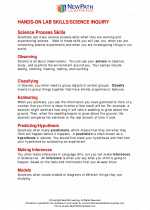
 Worksheet/Answer key
Worksheet/Answer key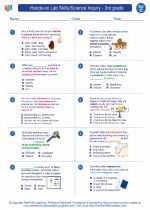
 Worksheet/Answer key
Worksheet/Answer key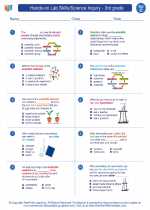
 Worksheet/Answer key
Worksheet/Answer key
 Worksheet/Answer key
Worksheet/Answer key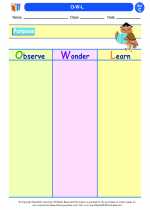
 Vocabulary/Answer key
Vocabulary/Answer key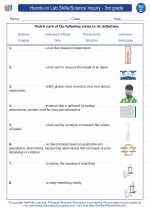
 Vocabulary/Answer key
Vocabulary/Answer key